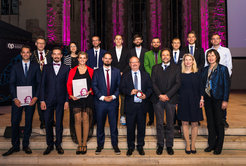Marcus Wenzel honoured as the best Ph.D. student of the Department of Process and Systems Engineering in 2019
Closing the Carbon Cycle: Research on Syngas Production from Carbon Dioxide

Dr.-Ing. Marcus Wenzel has been distinguished as the best Ph. D. student by the Department of Process and Systems Engineering of the Otto von Guericke University in the period 2018 - 2019 for his Ph.D. thesis on ”Reverse Water-Gas Shift Chemical Looping for Syngas Production from CO2”.
Syngas is widely used in the chemical industry as building block for the production of many bulk chemicals and chemical intermediates. Replacing the traditional syngas production routes from fossil fuels with sustainable production routes based on CO2 and renewable electricity has the potential to drastically lower CO2 emissions and help to close the carbon loop to pave the way for a circular economy. The activation of CO2 is a key step in the context of carbon-capture-and-use (CCU) and power-to-chemicals (P2Chem) concepts.
“The dissertation thesis authored by Dr.-Ing. Marcus Wenzel investigates different process options for converting CO2 by use of hydrogen via the reverse water-gas shift reaction (RWGS). This reaction is a versatile tool for producing syngas as a starting point for a whole spectrum of chemicals and fuels, e.g. synthetic Fischer-Tropsch fuel components.”, says the supervisor Prof. Dr.-Ing. Kai Sundmacher in his evaluation of the dissertation. In particular, the reverse water-gas chemical looping (RWGS-CL) process is analyzed in detail. This process uses an oxygen storage material (OSM) as an intermediate for converting CO2 via the RWGS reaction into syngas.
“The thesis deals with an extremely important topic in Process Systems Engineering, namely the design of a process for the activation of CO2 by use of the chemical looping process concept. The work is distinguished by a unique combination of systematic model-based process evaluation and experimental validation.“ says Prof. Sundmacher. Above that, Marcus Wenzel succeeded to finish his project in a short period of time at the age of 30 and, at the same time, to care for his young family and his daughters. This is an impressive example of reconciling family life and scientific career.
Marcus Wenzel has studied Process Engineering at the Hochschule Anhalt in Köthen, Saxony-Anhalt, and graduated with the Bachelor of Engineering in 2010. From 2010 to 2013 he studied Mechanical and Process Engineering at the Otto von Guericke University Magdeburg in the master degree course, including one semester at the Technical University in Lappeenranta, Finland. For his master thesis he already cooperated with the Max Planck Institute Magdeburg. From 2013 to 2018 he worked as a Ph. D. student at the Max Planck Institute where he successfully defended his Ph. D. thesis in October 2018. He gained work experience during several internships, e.g. at ContiTech AG in Dannenberg, Wacker Chemie AG in Burghausen and Ningbo Oceanking Chemical Development Corporation in China. Currently, Marcus Wenzel is working as a postdoctoral scientist at the Max Planck Institute in Magdeburg where he continues to investigate the activation of CO2 via the reverse water-gas-shift (RWGS) reaction as well as the sustainable production of syngas from CO2.
The Otto von Guericke University Magdeburg traditionally honors excellent research and teaching as well as the best Ph. D. graduates of its nine departments every year.

Academic Ceremony of the Otto von Guericke University Magdeburg on November 21st, 2019: (obere Reihe v.li.n.re) Prof. Dr.-Ing. Jens Strackeljan, Rektor der Universität Magdeburg, Dr. phil. Aikokul Maksutova, Fakultät für Humanwissenschaften, Dr. rer. nat. Marcus Müller, Fakultät für Naturwissenschaften, Dr. med. Alexander Markus Fehr, Medizinische Fakultät, Michael Belitz, Eike-von-Repgow-Stipendium, Dr.-Ing. Martin Beutner, Fakultät für Maschinenbau, Dr.-Ing. Tim Pfeiffer, Fakultät für Elektrotechnik und Informationstechnik, Dr. rer. pol. Stefan Kupfer, Fakultät für Wirtschaftswissenschaft, Jun.-Prof. Dr. Dan Verständig, Lehrpreis
(untere Reihe v. li. n. re) Dr. rer. nat. Alexander Meier, Fakultät für Mathematik, Dr.-Ing. Marcus Wenzel, Fakultät für Verfahrens- und Systemtechnik, Dr.-Ing. Monique Meuschke, Fakultät für Informatik, Dr. rer. medic. Sascha Kopp, Medizinische Fakultät, Dr.-Ing. Wolfram Knapp, Otto-von-Guericke-Verdienstmedaille, Forschungspreisträger Prof. Dr. Thomas Fischer, Prorektorin für Forschung, Technologie und Chancengleichheit, Prof. Dr. rer. nat. Monika Brunner-Weinzierl und Prof. Dr. Franziska Scheffler, Prorektorin für Studium und Lehre.

